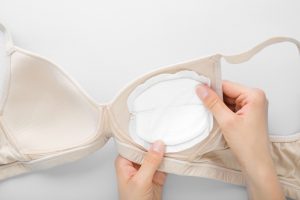Breast Health
10 Tips on Breastfeeding

Breastfeeding is recommended for at least the first six months of a newborn’s life and can be continued till they are two years of age. Breast milk not only provides babies with all the necessary nutrients and immunity that they need, it also helps new mothers bond and connect with a newborn baby.
Read on to learn 10 tips on breastfeeding for mothers, to make sure this journey is smooth and enjoyable for both the mother and baby.
Tip #1: Get in a comfortable position
Generally, babies need to be breastfed for 30 – 45 minutes at a time, alternating between the breasts. Moms should be comfortable and prepared while breastfeeding as it can take a long time. It doesn’t just help the new mom be at ease but it also helps the baby. If the mother keeps moving about, trying to get comfortable while the baby is feeding, it can be difficult for the baby to latch on and maintain the feed.

Breastfeeding on the bed or the couch, with pillows for back support can make the whole process significantly more comfortable for new mums. Lying on the side to breastfeed is another comfortable position often recommended to new moms.
Tip #2: Don’t Be Afraid to Ask for help
Giving birth and going through all the changes of pregnancy can be tough on the body, and having to breastfeed right after it may not be easy. It is okay to ask for help, especially from experienced obstetricians/ gynaecologists or breast specialist regarding breastfeeding.

This can reduce the stress for the mother as she learns to breastfeed correctly.
Tip #3: Give feed based on the baby’s hunger
While babies should be fed every four to five hours, it is also important to look out for signs of hunger in between. These include repeated turning or raising of the head, opening and closing of the mouth, sticking tongue out, and suckling on toys and objects nearby. If babies are still not fed after some time has passed, they will then start to cry.
Waking a baby up from a nap because of scheduled feeds may result in a struggle between the mom and the baby. Offering a breast when the baby shows initial signs of hunger may decrease the chances of them struggling, resulting in an easier and quicker latch-on.
Tip #4: Avoid pacifiers
Pacifiers are not recommended during the first month of the newborn’s life as it may interrupt their hunger cues. They are also less likely to spend enough time on the breast as mothers cannot recognize the reduced signs of hunger, and the babies themselves won’t accept the breast. This is known as ‘nipple confusion.
To avoid ‘nipple confusion’ in newborns, mothers should only introduce pacifiers after breastfeeding is well established.
Tip #5: Look out for signs that breastfeeding is working
More often than not, new mothers worry that their child isn’t gaining weight and give up on breastfeeding completely. This loss of confidence in breastfeeding may affect their milk supply and eventually affect the baby’s growth and development. As long as the baby looks healthy, and is meeting his/her growth and developmental milestones, mom mothers should be encouraged to continue breastfeeding.t.
Tip #6: Take care of the breast and nipples
Breastfeeding can make the sensitive skin of the breast and the nipple region very dry. This can lead to cracks in the skin and nipple which will cause pain during breastfeeding. Moisturisers, soothing creams, and even some healing balms for the nipple can help to prevent and treat cracked and irritated skin.
Tip #7: Do not push the back of the baby’s head
While breastfeeding, it is important to ensure the baby is properly latched. Many mothers will often do so by pushing the back of the baby’s head but that is only going to make the baby pull back. Instead, gently pushing between the baby’s shoulders may help to do the trick.
Tip #8: Know that leaking is normal
During the first couple of weeks, milk is going to leak from the breasts, especially at the sound of a baby crying. It is not a cause for concern and eventually, this leakage will decrease and disappear completely.
Nursing pads, also known as breast pads, are a very useful breastfeeding accessory. Placed into nursing bras, these pads can absorb breast milk from leaking breasts to protect your clothing from milk stains and prevent embarrassment.

Tip #9: Avoid engorgement of the breast
While breastfeeding, sometimes breasts can make more milk than what the baby requires, resulting in engorgement of the breast. This causes breasts to become hard, which makes it difficult for the baby to feed, further worsening the engorgement. Hand express the milk by massaging the breast, while under a warm shower can help increase the flow of the milk and reduce the swelling.
Tip #10: Drink enough water
It may seem trivial, but it is actually quite important to stay hydrated for breastfeeding mums. The body is recovering from pregnancy and childbirth while producing milk for the newborn so it is important to stay hydrated.

Milk production, in itself, requires water so the mother has to drink enough water for two; herself, and the baby. The general recommendation is to drink a glass of water with every feed to ensure that the mother is staying well hydrated.
Conclusion
Breast milk is essential for your baby’s health as it contains many beneficial nutrients and antibodies. There are also a lot of other benefits to breastfeeding for both the baby and the mother, such as building a special bond with the baby. For new mums, breastfeeding can be quite challenging. However, they should also remember that these issues are common and should not be discouraged.
Breastfeeding can be taught and over time with enough patience and practice, most mothers will find that it gets easier and is actually an enjoyable bonding experience with their baby. At SOG, our team of experienced obstetricians/ gynaecologists and breast specialist can help guide new mothers through their breastfeeding journey.
WHO WE ARE
About SOG Health Pte. Ltd.
Established in 2011, SOG Health Pte. Ltd. (“SOG”) is a leading healthcare service provider dedicated to delivering holistic health and wellness services to the modern family.
With a long and established track record in Singapore providing Obstetrics and Gynaecology (“O&G”) services such as pre-pregnancy counselling, delivery, pregnancy and post-delivery care, the Group has since further expanded its spectrum of healthcare services to include Paediatrics, Dermatology, and Cancer-related General Surgery (Colorectal, Breast & Thyroid).
The Group’s clinics, under its four operating segments of O&G, Paediatrics, Oncology and Dermatology, are strategically located throughout Singapore to provide easy access to its patients.
- Obstetrics
- Gynaecology
- GynaeOncology
- Breast, Thyroid & General Surgery
- Colorectal, Endoscopy & General Surgery
- Dermatology
- Paediatrics
Consult With A Specialist From SOG
Visit one of our specialists today to learn more about your health!
Recommended Specialists
Book An Appointment
Fill up this form and our clinic will get back to you shortly.
For general enquiries, please click here.









